#corrupt News media Reuters
Text
[BBC is UK State Media]
Months in jail alongside ally and kingmaker Ousmane Sonko ended suddenly, with the pair released the week before the presidential election.
Now Mr Clean, as he's nicknamed, must get to work on the sweeping reforms he has promised.[...]
Fighting poverty, injustice and corruption are top of Mr Faye's agenda. While working at the Treasury, he and Mr Sonko created a union taskforce to tackle graft.
Gas, oil, fishing and defence deals must all be negotiated to better serve the Senegalese people, says Mr Faye.
He is ushering in an era of "sovereignty" and "rupture" as opposed to more of the same, he told voters, and that is especially true of ties to France.
Senegal's president-elect says he will drop the much-criticised CFA franc currency, which is pegged to the euro and backed by former colonial power France.
Mr Faye wants to replace it with a new Senegalese, or regional West African, currency[...]
Strengthening judicial independence and creating jobs for Senegal's large young population are also key priorities for Mr Faye[...]
One of Mr Faye's heroes is the late Senegalese historian Cheikh Anta Diop - whose work is seen as a precursor to Afrocentrism. Both are seen as left-wing cheerleaders for pan-Africanism.
As early results came in on Monday showing Mr Faye was set for victory, people in the capital, Dakar, celebrated by honking car horns and singing to loud music.
The reaction from international markets was less jubilant, with Senegal's dollar bonds falling to their lowest level in five months. Reuters news agency reports that investors are concerned Mr Faye's presidency may wind down the country's business-friendly policies.
25 Mar 24
296 notes
·
View notes
Text

So they post this and everyone in the replies goes off about they totally knew that everything we hear about China is wrong. Disclose, of course, neglects to post the article (or mention that it was reuters who posted the story) and anyone who mentions that no one has to lie to make people see how bad China really is gets slammed by a dozen useful idiots insisting that they must be CIA and that anyone who ever argued with them about China was a CIA disinfo account. The boogeyman of "Russian Bots" never really went away, did it?
In the actual fucking article, it's actually got nothing to say about lying about gutter oil, open air markets, Uighur concentration camps, slave labor wages where workers are illegally forced to live in the factory, tofu dreg construction, rampant political corruption, etc etc... Here's the key points.
Two years into office, President Donald Trump authorized the Central Intelligence Agency to launch a clandestine campaign on Chinese social media aimed at turning public opinion in China against its government, according to former U.S. officials with direct knowledge of the highly classified operation.
Three former officials told Reuters that the CIA created a small team of operatives who used bogus internet identities to spread negative narratives about Xi Jinping’s government while leaking disparaging intelligence to overseas news outlets.
...
The CIA team promoted allegations that members of the ruling Communist Party were hiding ill-gotten money overseas and slammed as corrupt and wasteful China’s Belt and Road Initiative, which provides financing for infrastructure projects in the developing world, the sources told Reuters.
Wow... Really spinning some absurd yarns there by shitposting at Chinese people under fake Chinese identities and telling them things that are actually happening.
Fucking hysterical that China would try and retaliate and say they'd NEVER do anything like that to America when the 50-Cent Army does what the CIA did, only worse and on a larger scale and is still operating to this day.
43 notes
·
View notes
Text
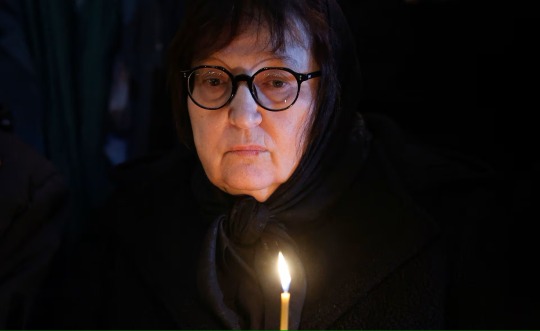
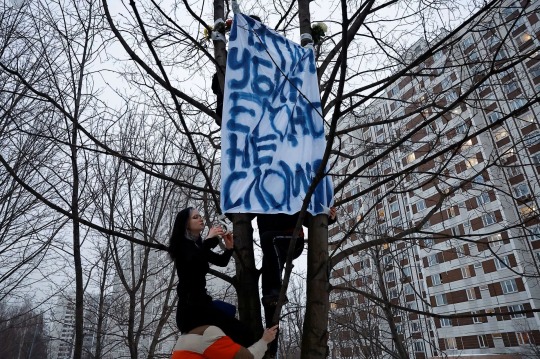
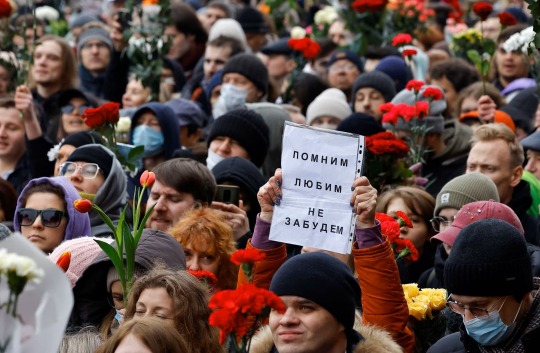
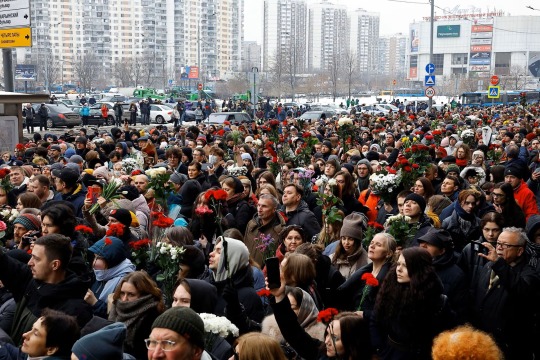

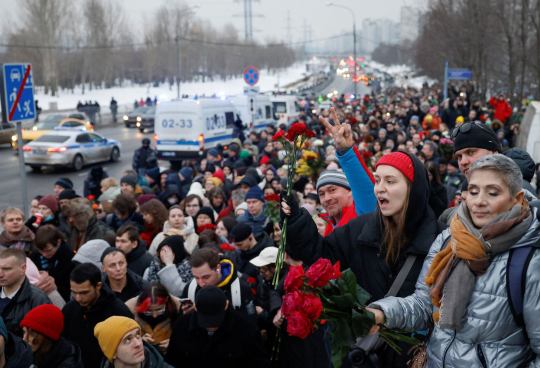
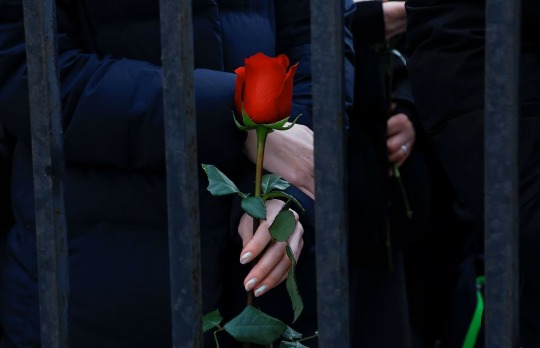
Alexei Anatolyevich Navalny (4 June 1976 – 16 February 2024)
Mr Navalny was a Russian opposition leader, lawyer, anti-corruption activist, and political prisoner.
He organised anti-government demonstrations and ran for office to advocate reforms against corruption in Russia and against Dictator Vladimir Putin and his government.
Mr Navalny was founder of the Anti-Corruption Foundation (FBK). He was recognised by Amnesty International as a prisoner of conscience, and was awarded the Sakharov Prize for his work on human rights.
Through his social media channels, Mr Navalny and his team published material about corruption in Russia, organised political demonstrations and promoted his campaigns. In a 2011 radio interview, he described Russia's ruling party, United Russia, as a "party of crooks and thieves", which became a popular epithet.
Mr Navalny and the FBK have published investigations detailing alleged corruption by high-ranking Russian officials and their associates. He twice received a suspended sentence for embezzlement, in 2013 and 2014. Both criminal cases were widely considered politically motivated and intended to bar him from running in future elections. He ran in the 2013 Moscow mayoral election and came in second with 27% of the vote but was barred from running in the 2018 presidential election.
In August 2020, Mr Navalny was hospitalised in serious condition after being poisoned with a Novichok nerve agent. He was medically evacuated to Berlin and discharged a month later. He accused Putin of being responsible for his poisoning, and an investigation implicated agents from the Federal Security Service.
In January 2021, Mr Navalny returned to Russia and was immediately detained on accusations of violating parole conditions while he was hospitalised in Germany. Following his arrest, mass protests were held across Russia. In February 2021, his suspended sentence was replaced with a prison sentence of over 2+1⁄2 years' detention, and his organisations were later designated as extremist and liquidated.
In March 2022, Mr Navalny was sentenced to an additional nine years in prison after being found guilty of embezzlement and contempt of court in a new trial described as a sham by Amnesty International; his appeal was rejected and in June, he was transferred to a high-security prison.
In August 2023, Mr Navalny was sentenced to an additional 19 years in prison on extremism charges.
In December 2023, Navalny went missing from prison for almost three weeks. He re-emerged in an Arctic Circle corrective colony in the Yamalo-Nenets Autonomous Okrug.
On 16 February 2024, the Russian prison service reported that Mr Navalny had died at the age of 47. His death sparked protests, both in Russia and in various other countries. Accusations against the Russian authorities in connection with his death have been made by many Western governments and international organisations.
Rest in Power !
Lyudmila Navalnaya, the mother of late Russian opposition leader Alexei Navalny, attends a funeral service and a farewell ceremony for her son at the Soothe My Sorrows church in Moscow, Russia, March 1.
People attach a banner to a tree near the Borisovskoye cemetery after the funeral of Russian opposition politician Alexei Navalny, in Moscow, Russia, March 1. A slogan on the banner refers to Russian President Vladimir Putin and reads: "Putin killed him but didn't break (his spirit)"
People walk towards the Borisovskoye cemetery during the funeral of Russian opposition politician Alexei Navalny in Moscow, Russia, March 1, 2024. A placard reads: "We remember, we love, we won't forget".
People walk towards Soothe My Sorrows church in Moscow, Russia and Borisovskoye cemetery during the funeral of Russian opposition politician Alexei Navalny in Moscow, Russia, March 1.
Courtesy: REUTERS/Stringer
#human rights#humanity#art#equal rights#freedom#photography#peace#love#russia#dictatorship#vladimir putin#alexei navalny#murder#moscow#funeral#reuter#rip alexei navalny#political#corruption#activism#stringer#1 March 2024#March 1#2024#march 2024
25 notes
·
View notes
Text
Two years into office, President Donald Trump authorized the Central Intelligence Agency to launch a clandestine campaign on Chinese social media aimed at turning public opinion in China against its government, according to former U.S. officials with direct knowledge of the highly classified operation.
Three former officials told Reuters that the CIA created a small team of operatives who used bogus internet identities to spread negative narratives about Xi Jinping’s government while leaking disparaging intelligence to overseas news outlets. The effort, which began in 2019, has not been previously reported.
During the past decade, China has rapidly expanded its global footprint, forging military pacts, trade deals, and business partnerships with developing nations.
The CIA team promoted allegations that members of the ruling Communist Party were hiding ill-gotten money overseas and slammed as corrupt and wasteful China’s Belt and Road Initiative, which provides financing for infrastructure projects in the developing world, the sources told Reuters.
Yes Trump will destabilize China by using the CIA to deploy the highly effective political messaging strategy of the "Resist Lib"
14 notes
·
View notes
Text
A Russian political influence campaign is shaking up Europe, as top officials warned Moscow paid European Parliament members to interfere in the upcoming EU election.
"This confirms what we have suspected: the Kremlin is using dodgy outlets pretending to be media [and] using money to buy covert influence,” European Commission Vice President Věra Jourová told Brussels Playbook, calling the revelations “very troubling.”
The scandal broke when the Czech government on Wednesday sanctioned a news site called Voice of Europe, which Prague said was part of a pro-Russian influence operation. Belgian Prime Minister Alexander De Croo said Thursday that Russia had approached EU parliament members (MEPs) and "paid [them], to promote Russian propaganda.”
The new Russian influence campaign comes with less than three months to go before the European Parliament election on June 6-9. It echoes concerns of corruption and foreign meddling brought to the fore by the Qatargate corruption scandal that rocked the European Parliament less than two years ago.
"We can't afford to be one step behind Putin and his propaganda army on a chess board ... We have to constantly bear in mind he will use the disinformation and foreign interference as a weapon to divide Europe," Jourová said.
The influence scandal revolved around the website Voice of Europe. The Czech foreign ministry sanctioned Ukrainian oligarch Viktor Medvedchuk, an ally of Russian President Vladimir Putin, as well as Voice of Europe itself and a person called Artem Pavlovich Marchevskyi presumed to be involved in the operation.
Medvedchuk was running a “Russian influence operation” from Russia on Czech territory using Voice of Europe, authorities said in a statement.
“This decision is in the security interest of the Czech Republic, as well as contributing to the protection of the democratic nature of the forthcoming elections to the European Parliament,” the Czech foreign ministry said.
Polish security services said Thursday they had carried out searches as part of the cross-border investigation in Warsaw and Tychy in western Poland, Reuters reported. Local media cited the security services' statement saying authorities had seized €48,500 and $36,000. Poland's Internal Security Agency's website has been down since Thursday evening.
Voice of Europe’s YouTube page throws up a parade of EU lawmakers, many of them belonging to far-right, Euroskeptic parties, who line up to bash the Green Deal, predict the Union’s imminent collapse, or attack Ukraine. There is no suggestion that those appearing on the network accepted cash.
The website has its roots in the Netherlands, Dutch daily NRC reported. An entrepreneur linked to the site at the time “worked with” far-right leader Thierry Baudet in 2016 “to bring about the Ukraine referendum,” the paper wrote, referring to a non-binding vote in which Dutch voters opposed a political association agreement between Ukraine and the EU.
Voice of Europe’s website was unavailable on Thursday and its account on X hasn’t posted since Wednesday.
"It is just a bitter joke to call this operation of Russian interference the 'Voice of Europe' but it shows clearly the level of despise Putin has towards our democracies," Jourová said.
The claim that MEPs were paid to speak up for the Kremlin has raised questions about who might have taken the cash.
A spokesperson for European Parliament President Roberta Metsola said in a statement: “The president is aware of the allegations being made and is looking into specific allegations.”
Italian European People's Party lawmaker Matteo Gazzini, who gave Voice of Europe an interview and participated in a panel debate alongside other MEPs, denied being offered or taking any money.
“Of course not, what a question is this?” he said. “It makes me laugh when you ask me if I got money from Russia … because I come from a very well-off family,” he said, adding that he is an agricultural and real estate entrepreneur who is only in politics to serve his country.
Asked about his comments on a Voice of Europe panel in which he said that Europe should not have the goal of defeating Russia, and instead focus on finding a path to peace in Ukraine, Gazzini said he condemned the invasion and that Russian troops should leave Ukraine. “At the same time, Europe should not help to escalate the situation,” he said.
He also blamed the European Parliament for letting Voice of Europe into the institution, where he said they first approached him. “If they are such a big threat, why [did] the European Parliament let these journalists inside? Why didn’t they check them?” he asked.
His EPP colleague Dennis Radtke, from Germany, said that Gazzini’s membership of the political group “has to be discussed.” Gazzini joined the EPP this year from the far-right Identity & Democracy grouping, having quit his League party to join Forza Italia.
“It underlines my skepticism with former members of Lega and the ID. Whoever is involved in this Russian network has to face consequences ... We have to defend our democracy and the integrity of our political institution,” Radtke wrote in a message.
A senior EPP group official said: “The EPP stands clearly and firmly on the side of Ukraine. We have been fighting against Putin‘s propaganda and disinformation for years and we will continue to do so.”
The S&D group joined others in calling for an urgent debate.
15 notes
·
View notes
Text
Russia makes money primarily off of fossil fuels. It does have decent agricultural exports but those alone could not pay for Putin's war machine. So disrupting Russia's oil and gas industry is a way of reducing the country's revenue which allows it to conduct an illegal war of aggression.
Hostile drones have been winding their way across the Russian landscape this winter, striking refineries and related oil and gas infrastructure all the way from the Baltic Sea in the northwest to the Black Sea in the southwest.
Drones attacked both the Ilsky and Afipsky refineries in Russia's Krasnodar region, east of occupied Crimea, on Feb. 9, less than a week after another refinery in Volgograd, the largest in southern Russia, was hit. Further attacks have struck other refineries and oil depots near the Ukrainian border, as well as much deeper into Russian territory.
Though Ukraine does not typically confirm its actions outside its borders and Russia has not officially acknowledged drones were the cause of these incidents, media reports have identified Kyiv's hand in the attacks occurring with regularity as Moscow's invasion of Ukraine nears the two-year mark.
Analysts say the drone attacks are demonstrating that oil and gas targets of economic significance are not out of reach, even far from the front lines of the war.
The late Sen. John McCain nailed it.
Late U.S. Senator John McCain once derisively described Russia as being "a gas station masquerading as a country" — a jibe underlining the critical importance of oil and gas products to Moscow.
Indeed, Russia draws heavily on its resource reserves to support the state. The International Energy Agency says Russia's oil and gas export revenues accounted for 45 per cent of its federal budget in 2021.
Of course a lot of that fossil fuel money gets siphoned off by corrupt oligarchs who use it to purchase superyachts and expensive real estate in Western countries.
A January attack on a Novatek facility in Ust-Luga halted gas processing operations there for several weeks. The plant processes gas condensate into various fuel products that are exported to customers in Turkey and Asia, according to Reuters.
Sergey Vakulenko, a former strategy executive at Gazprom Neft, a subsidiary of the larger Russian energy firm, believes the Ust-Luga episode may illustrate a bigger problem for Russia than a temporary disruption to production at a single facility.
In a recent analysis published online, Vakulenko reasoned that if small drones can get all the way to Ust-Luga, which is hundreds of kilometres from the Ukrainian border, there are some 18 Russian refineries at risk of being targeted, and they account for more than half the country's refinery production. He's not the only analyst noticing this concern for Russia's refineries.
And because hundreds of thousands of competent Russians have (wisely) fled the country and others are being used as cannon fodder for Putin's war, it takes longer to repair facilities damaged by Ukraine.
And the fossil fuel industry mostly has to fend for itself.
Maxim Starchak, an independent expert on the Russian defence and nuclear industry, says regulations have been put in place to restrict drones from flying close to "the most significant fuel and energy sector facilities" and operators are using electronic warfare systems to defend against drone threats.
But Starchak said Russian energy firms must foot the bill for expenses related to defence of their facilities.
"Moscow will not specifically help," he said, noting Russian authorities may hold firms accountable for not putting measures in place to protect their facilities.
So that burden cuts down on revenue as it adds to the cost of doing business.
One thing Ukraine has been innovative at is drone technology. It's become one of the world's leaders at that.
As Ukraine continues to fight to repel Russian forces from its lands, its military leaders have signalled drones and related technology will be needed to win the war that seems to have no end in sight.
And Western countries find it easier to provide additional drones to Ukraine than to send tanks and cruise missiles.
So Russian convict troops can luxuriate in the ruins of Avdiivka while their oil refineries back home get blown up by Ukraine.
EDIT: Speaking of fuel, just saw this at NPR.
Putin's regime is 'running out of fuel,' a Russian opposition activist tells NPR
#invasion of ukraine#stand with ukraine#russia#oil refineries#russia's fossil fuel industry#drones#ukraine's targeting of russian oil infrastructure#russia's war of aggression#vladimir putin#putin dictatorship#kleptocracy#oligarchs#россия#нефтеперерабатывающие заводы#бпла#олигархи#владимир путин#путлер#путин хуйло#добей путина#союз постсоветских клептократических ватников#руки прочь от украины!#геть з україни#вторгнення оркостану в україну#йдемо на ви#зсу#деокупація#слава україні!#героям слава!
11 notes
·
View notes
Text
Elizabeth Tsurkov, an Israeli Middle East expert and Princeton political science student, loved posting on X, formerly Twitter.
Her social media posts praised protesters in Syria for their "immense courage," called out authoritarianism in Russia, and even lauded anti-corruption protesters in her native Israel.
And then, on March 21, 2023, the posts stopped.
Tsurkov, 37, who was doing field studies in the Karrada district of Baghdad for her doctoral dissertation, was kidnapped by what Israeli and U.S. government officials say was Kataib Hezbollah, one of many Iranian-backed militia groups that in recent months have conducted more than 170 attacks on U.S. troops in Iraq and Syria.
Tsurkov's abduction, which happened while she was leaving a Baghdad café, reignited scrutiny over the deep ties between Kataib Hezbollah and the Iraqi government.
After Tsurkov's kidnapping, Iraq did not immediately acknowledge her disappearance. But Iraqi officials, in a July statement to Reuters, said the government had launched an investigation into her abduction.
The Iraqi government repeatedly declined to speak to ABC News on the record about Elizabeth Tsurkov or Kataib Hezbollah.
_____________
Proof of life
For months after Tsurkov's disappearance, there was no word. No progress. No ransom demands. Tsurkov's family didn't even have proof she was alive.But then, seven months after she was taken, a video showing a woman who appeared to be Elizabeth Tsurkov was broadcast on the Iraqi TV station Al Rabiaa. The woman had black, unkempt hair. She had dark circles under her eyes. And she read, in Hebrew, what Tsurkov's family says was a coerced statement and falsely claimed she was both an Israeli spy and a CIA agent.Emma Tsurkov, Elizabeth's sister, called that claim "absurd.""She has never seen a power structure she did not want to criticize. She would be the worst suited person to be a spy ever in existence."Emma Tsurkov believes her sister was kidnapped by Kataib Hezbollah militants because she is an Israeli citizen. Israel and Iraq do not have formal diplomatic relations, so Elizabeth Tsurkov, who attends Princeton on a U.S. student visa, traveled into the country with a passport from Russia, a country where she also has citizenship.Nearly a year since Elizabeth Tsurkov's kidnapping, Emma Tsurkov has not given up hope her sister will be released."It's like I'm missing a limb, but no one can see it," she told ABC News. "We're not twins, but I guess we're as close to twins as people who aren't twins can be, and I know in my gut that she's alive. I trust her to keep herself alive. And I know that she is trusting me to get her out of there."
Getting Elizabeth home
In her attempts to secure her sister's release, Emma Tsarkov is pushing the United States to put pressure on the Iraqis because of what she says are significant, sometimes overlooked connections between the Iraqi government and the terrorist group holding Elizabeth, Kataib Hezbollah."The only thing standing between her and freedom is a stern phone call from Washington, D.C., to Baghdad, telling the Iraqi government 'you need to get her out.' This is not sustainable. She cannot stay there," Emma Tsurkov told ABC News.Kataib Hezbollah has an official role in the Iraqi government through its position in Iraq's Popular Mobilization Forces, or PMF, a government-sponsored organization of militias often compared to a kind of Iraqi national guard.The group is one of "at least four Iran-aligned militias that [have] attacked U.S. forces" while also being "part of the Popular Mobilization Forces, an umbrella group of militias that receives funding from the Iraqi government," according to a 2023 report by inspectors general for the Departments of State, Defense, and USAID."You don't have to be a rocket scientist to realize that you've got a dysfunctional formal Iraqi security establishment that has effectively been instrumentalized and co-opted by these militia groups," Ranj Alaaldin, Director of the Crisis Response Council and a fellow at the Middle East Council on Global Affairs, told ABC News.
________________
Founded in 2014, the PMF cobbled together numerous Iraqi militias and is most notable for its role in fighting ISIS. But several militias in the PMF, including Kataib Hezbollah, are supported by and have deep ties to Iran.
Alaaldin explains after the defeat of ISIS the influence of Kataib Hezbollah and similar militias only grew in Iraq with help from Iran, which experts say aims to use the groups to ultimately drive U.S. troops out of Iraq.
"As far as Iran and Kataib Hezbollah and the PMF are concerned, the U.S. presence in Iraq, U.S. forces, are the last remaining barrier to them imposing their influence and control on the country at large," he said.
Despite ties to Iran and repeated attacks on American troops in Iraq, experts warn Kataib Hezbollah leaders continue to play a significant role in the PMF and thus the Iraqi government, including holding key official roles in the Iraqi military establishment.
"They are part and parcel of the Iraqi state and government. They are recognized forces within the Iraqi Constitution," said Alaaldin, who added that relationship "presents a tricky conundrum for both the Iraqis but also the Americans, because it's not a very black and white picture."
It's a complex, geopolitical struggle that Emma Tsurkov is now forced to navigate. She says she will never give up on securing her sister's release.
"I am never going to stop until I have her back. The only question is how many obstacles will I have to overcome to get her back?" Emma Tsurkov said.
2 notes
·
View notes
Text
On the topic of Sri Lanka we NEED TO talk about the blatant violation of constitutional and human rights that’s going on in the country right now! Military and police brutality is rampant! Non-violent, peaceful protesters are being attacked ruthlessly by the military and the police in Colombo.
I was at the protest site in GalleFace in front of the presidential secretariat yesterday (09th July 2022) and was subjected to multiple tear gas attacks myself as we were trying to reach the area. We were not doing anything violent or breaking the law in anyway. They also shot tear gas at people who were protesting near the President’s residence. Moments before we got there, the police had also unleashed water canons on the protesters in the area. They had also attacked the protesters near the President’s residence with water canons.
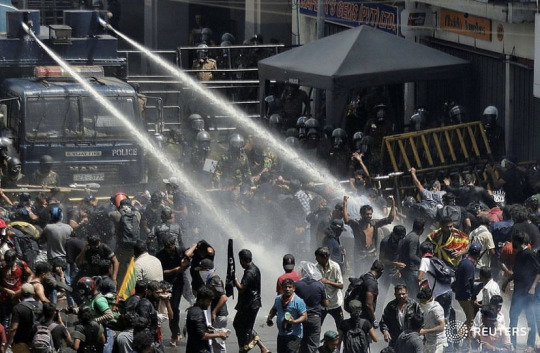
[Police use water cannons to disperse protesters near the president's residence during a demonstration demanding the resignation of President Gotabaya Rajapaksa, amid the country's economic crisis, in Colombo, Sri Lanka, July 9, 2022. REUTERS/Dinuka Liyanawatta]

[Protesters run away from tear gas used by police during a demonstration demanding the resignation of President Gotabaya Rajapaksa, amid the country's economic crisis, near the President's residence in Colombo, Sri Lanka, July 9, 2022. REUTERS/Dinuka Liyanawatte]
The day before yesterday, on the 8th of July 2022, Inter-University Students’ Federation on a protest march to the same protest site was also heavily attacked with water canons and tear gas. AGAIN the students were in no way or form breaking any laws, committing any crimes, damaging properties or vandalizing anything.
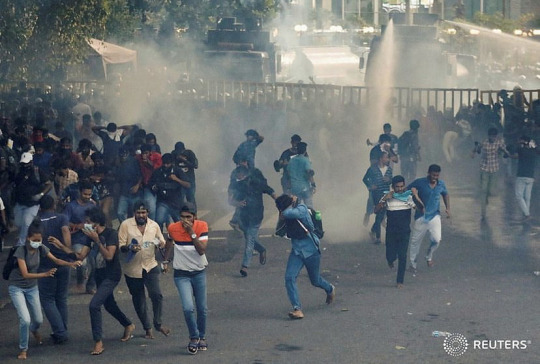
[Police use tear gas and water cannons to disperse protesters near the president's residence during a demonstration demanding the resignation of President Gotabaya Rajapaksa, amid the country's economic crisis, in Colombo, Sri Lanka, on July 8, 2022. REUTERS/Dinuka Liyanawatte]
Also armed security forces shot at unarmed peaceful protesters on Chatham Street, Colombo. In this footage you can see that one person collapse and how he has a head injury. And no, they were NOT rubber bullets. Those are apparently live rounds being shot at those civilians.
Also more video footages are emerging of Sri Lanka security forces brutally attacking protesters moments before protesters entered the President's house yesterday.
Last night two media personnel were attacked ON LIVE TV while they were reporting in front of the PM’s residence by the STF-Special Task Force of Sri Lanka. The reporter, a 23 year old named Sarasi Pieris and the cameraman, Waruna Sampath as well as more people from their crew were hospitalized following being repeatedly beaten and brutally assaulted by security detail at the Prime Minister's private residence.
More journalists and media personnel are now speaking out about how the police and the STF tried to get them out of the places they were hiding in order to round them up and wrongfully arrest them. (Thankfully they were on live the whole time.)
This is only a fraction of what they have done. I will keep updating as I come across more credible sources and first hand experiences. So while we all celebrate the achievements from yesterday (which should not be undermined in any way cause after all they are big steps forward in the fight against these corrupt politicians) let’s also be aware of how the government and its pet police and military will not hesitate to immediately attack the very civilians they swore to protect WITHOUT any provocation.
Additionally, under the cut are some reliable sources from Sri Lanka to keep an eye out for updates.
Twitter
News First.lk Sri Lanka
Roel Raymond (journalist)
News Wire
Team Watchdog
Instagram
Dinuka Liyanawatte
Amalini (live updates in stories)
Team Watchdog Instagram
#tw police brutality#tw police#sri lanka protests#sri lanka#police brutality#ACAB#gohomegota2022#go home gota#අරගලයට ජය!#gotabhaya rajapaksa#ranil wickremesinghe#world politics#current events
44 notes
·
View notes
Text
New corruption allegations have been made against former Pakistan Prime Minister Imran Khan
Former Prime Minister of Pakistan Imran Khan. File Photo | Photo credit: REUTERS
Pakistan’s accountability watchdog has filed fresh corruption charges against jailed former prime minister Imran Khan, accusing him of “illegally” possessing and selling seven expensive watches and 10 other precious gifts belonging to the state gift treasury during his tenure, media reports said. On Sunday.
The…

View On WordPress
0 notes
Text
Friday, December 22, 2023
Americans May Be Taking On Too Much Pay-Later ‘Phantom Debt’
(NYT) “Buy now, pay later” loans are helping to fuel a record-setting holiday shopping season. Economists worry they could also be masking and exacerbating cracks in Americans’ financial well-being. The loans, which allow consumers to pay for purchases in installments, often interest-free, have soared in popularity because of high prices and interest rates. Retailers have used them to attract customers and to get people to spend more. But such loans may be encouraging younger and lower-income Americans to take on too much debt, according to consumer groups and some lawmakers. And because such loans aren’t routinely reported to credit bureaus or captured in public data, they could also represent a hidden source of risk to the financial system. “The more I dig into it, the more concerned I am,” said Tim Quinlan, a Wells Fargo economist who recently published a report that described pay-later loans as “phantom debt.”
US health care spending
(Statnews) The U.S. government spent more on health care last year than the governments of Germany, the U.K., Italy, Spain, Austria, and France combined spent to provide universal health care coverage to the whole of their population (335 million in total), which is comparable in size to the U.S. population of 331 million. Overall, health care spending grew 4% in 2022 from the previous year, accounting for 17.3% of gross domestic product.
Live from the Jungle: Migrants Become Influencers on Social Media
(NYT) Manuel Monterrosa set out for the United States last year with his cellphone and a plan: He’d record his journey through the dangerous jungle known as the Darién Gap and post it on YouTube, warning other migrants of the perils they’d face. In his six-part series, edited entirely on his phone along the way, he heads north with a backpack, leading viewers on a video-selfie play-by-play of his passage across rivers, muddy forests and a mountain known as the Hill of Death. He eventually made it to the United States. But to his surprise, his videos began attracting so many views and earning enough money from YouTube that he decided he no longer needed to live in America at all. So, Mr. Monterrosa, a 35-year-old from Venezuela, returned to South America and now has a new plan altogether: trekking the Darién route again, this time in search of content and clicks, having learned how to make a living as a perpetual migrant. For more than a decade, cellphones have been indispensable tools for people fleeing their homelands, helping them research routes, find friends and loved ones, connect with smugglers and evade the authorities. Now, cellphones and social media platforms like Facebook, YouTube and TikTok are drastically changing the equation once again.
US and Venezuela agree to release of 10 Americans
(CNN) The US has reached an agreement to secure the release of six wrongfully detained Americans and four other Americans held in Venezuela, senior US officials announced Wednesday. The deal will also include the extradition of Leonard Francis, the former military contractor known as “Fat Leonard” who orchestrated the largest corruption scandal in US Navy history. “Fat Leonard” Francis, a senior administration official said, will be returned to a federal detention facility. Francis, a Malaysian national, was arrested in 2013, pleaded guilty and—while he was on house arrest awaiting sentencing—he cut off his ankle tracking bracelet and fled to Venezuela. In exchange, Biden made what officials cast as a “difficult” decision to grant clemency to Alex Saab, an alleged financier to Venezuela President Nicolas Maduro.
Brazilian ‘geese agents’ honk in case of prison break
(Reuters) Waddling around the perimeter of a prison in Brazil’s southern state of Santa Catarina, geese have edged out their canine predecessors on patrols to make sure inmates do not escape. Between breaks in their on-site pond, the honking birds, dubbed “geese agents,” patrol a green space between the prison’s inside fence and main outer wall. Staff say the vigilance of the geese make them excellent guard animals, even more so than dogs. “We have electronic surveillance, in-person surveillance ... and finally the surveillance of the geese,” said prison director Marcos Roberto de Souza. Souza said tending the flock of geese is more affordable than raising dogs and that the quiet location of the prison makes it a viable option for his facility.
A baroness’s lies bring Britain’s covid spending scandal to a boil
(Washington Post) Michelle Mone calls herself one of Britain’s “most celebrated” entrepreneurs. She frequently speaks about her “rags to riches” life story: How she went from the “rough streets” of Scotland to become a lingerie tycoon who was honored by the queen and then made a baroness in the House of Lords by a prime minister. Now, Baroness Mone is the face of an escalating scandal that has gripped the British public. She has admitted to lying about her role in facilitating a multimillion-pound deal to sell the government personal protective equipment during the coronavirus crisis—including some 25 million hospital gowns that the government claims were unusable—and standing to personally profit. “The public probably see me as a horrible person, a liar, or even a cheat,” Mone said last week. Yet Mone’s apology on Sunday for lying about her links to the company under investigation by the government is not just a personal image issue. It is piling pressure on Britain’s Conservative government over its response to the pandemic and raising questions about whether it gave preferential deals to politically connected business owners.
At least 15 people were killed in a shooting in Prague
(NYT) A gunman in the Czech Republic killed at least 15 people today, including 14 students at Charles University in Prague, the authorities said. At least 24 others were wounded at the university. The assailant, identified as David K., a 24-year-old student at the university, also died. He first killed his father in their family home outside Prague before going on a shooting rampage and then killing himself, the police said. The chief of the national police force said the gunman “got inspired by a similar terrible event abroad.”
Ukraine war: Male citizens living abroad to be asked to join army
(BBC) Ukrainian men between the ages of 25 and 60 living abroad will be asked to report for military service, Defence Minister Rustem Umerov has said. He described this as an "invitation"—but seemed to suggest anyone who did not comply would be sanctioned. However, a spokesman later clarified that no call-up was being considered. President Zelensky told journalists on Tuesday that 450,000-500,000 new soldiers were needed but achieving this was a "sensitive issue". In an analysis of figures from EU statistics agency Eurostat in November, BBC Ukrainian found that some 768,000 Ukrainian men aged 18-64 had left the country for the EU alone since the start of Russia's full-scale invasion. Mr Zelensky suggested in his end-of-year news conference on Tuesday that there were currently 500,000 Ukrainian troops at the front. He also said there were issues with rotation and holidays. Currently conscripts and volunteers are obliged to serve until the end of the war, and are only allowed 10 days' leave a year.
The U.S. is looking to use Russian assets to aid Ukraine
(NYT) The Biden administration has quietly signaled support for seizing more than $300 billion in Russian central bank assets held in Western countries and using the funds to aid Ukraine’s war effort. Until recently, Treasury Secretary Janet Yellen had argued that seizing the funds without congressional action would be illegal. Others had cautioned that it would cause concern among other nations that are holding their funds in the U.S. Seizing such a large sum of money from another sovereign nation would be without precedent. But with financial support waning, and Ukrainian leaders warning of the dire consequences, American officials have begun urgent discussions over whether to use existing authorities or seek congressional action to use the funds. A small portion of the Russian assets, perhaps $5 billion or so by some estimates, is in the hands of U.S. institutions. As a result, diplomatic negotiations are underway over how to gain access to funds held in Europe.
China vows to keep up military pressure on the Philippines as territorial dispute grows tenser
(AP) China’s Foreign Minister Wang Yi says the country will maintain military pressure on the Philippines amid a dispute over sovereignty in the South China Sea that could involve U.S. forces defending their treaty partner. In a phone conversation Wednesday with his Philippine counterpart, Enrique A. Manalo, Wang “warned that if the Philippine side misjudges the situation, goes its own way, or even colludes with ill-intentioned external forces to continue to stir up troubles, China will defend its rights in accordance with law and respond resolutely,” the official Xinhua News Agency reported. Wang’s comments follow China’s mobilization of its coast guard and maritime militia to block Philippine supply missions to support its soldiers and fishermen. China claims sovereignty over virtually the entire South China Sea, one of the world’s most crucial waterways for shipping, putting it at odds with the Philippines, Vietnam, Malaysia, Taiwan and Brunei, who all maintain claims over islands, reefs and undersea resources in the region.
An Egg Fried Rice Recipe Shows the Absurdity of China’s Speech Limits
(NYT) The United States is entangled in an emotional debate about antisemitism and free speech on college campuses. The latest speech debate in China is about a chef’s video on how to make egg fried rice. Egg fried rice is a staple of Chinese home cooking and one of the first dishes many Chinese learn to cook. Think of mac and cheese in America. That was probably why Wang Gang, one of China’s most popular food bloggers, has made multiple recipe videos about the dish in the past five years. His “perfect” fried rice recipes attracted reviews, and reviews of those reviews. Then one of those videos drew the wrath of the official Chinese media and internet. His offense? He posted an egg fried rice video on Nov. 27, two days after the anniversary of the death of Mao Anying, son of the founder of the People’s Republic of China, Mao Zedong. Mao Anying was killed in the Korean War while, legend has it, cooking egg fried rice. On social media sites, Mr. Wang was called “a traitor,” “a troublemaker” and “the dregs of society.” Everyday life is being politicized in China. Public expression has become impossible when too many things are taboo. It’s difficult to track, and sometimes impossible to know because of censorship, what can and cannot be said in the country.
‘I don’t want to be a number’
(BBC) The number of people killed in Gaza since Israel launched military action in response to the 7 October attacks has passed 20,000, according to the Hamas-run health ministry. BBC staff in the territory have been hearing from those affected: The children at al-Aqsa hospital do not think of the dead of Gaza in figures of thousands. Theirs is a more intimate reckoning. It is counted in beloved faces that have vanished into the fire and rubble of the war. Thirteen-year-old Rama Zaqout was sleeping when an Israeli missile struck the mosque in which she was sheltering with her family. She woke in hospital to discover that her two-year-old brother, Hisham, and many other family members were dead. She lists the names of those killed in a voice that seems detached from the immense loss she has experienced. Rama survived with severe wounds to her left hand and right leg, but the hospital does not have the facilities to treat her injuries properly. If she is not evacuated from Gaza, she says, both limbs will be amputated. “Running and drawing were once my best hobbies,” Rama says, “but without the proper treatment, I won’t be able to enjoy them again… I dream of a life like other children around the world, where I can again run and draw.”
1 note
·
View note
Text
By Gerardo ArbaizaSAN SALVADOR (Reuters) - El Salvador's Congress repealed a law on Wednesday that criminalized the publication of gang messages, as ruling party leaders declared victory in their war against criminal groups.President Nayib Bukele launched a sweeping crackdown on the small Central American nation's hyper-violent gangs early last year, sharply reducing crime rates while the incarceration skyrocketed, and is now the highest in the world.Lawmakers passed the reform to target anyone who spread or otherwise reproduced graffiti "or any form of visual expression" attributed to gangs, including Mara Salvatrucha and its rival Barrio 18.The law's critics argued it unjustly targeted journalists, who often source stories based on images showing graphic violence, including messages left by alleged gang members, or even interviews, graffiti and audios shared on social media.The senior legislator from Bukele's New Ideas party behind the original measure, Christian Guevara, was added to a U.S. blacklist for "corrupt and undemocratic actors" - commonly known as the "Engel List" - for promoting the law.No arrests were ever made under the law, though El Salvador's journalists association APES slammed it as "a clear attempt at censorship of media" immediately after it was approved.Legistlators who had backed the law said it had served its purpose."We have won the war on gangs and we can change our criminal policy," said Walter Coto, a New Ideas congressman, as the repeal was passed by all legislators present.Bukele enjoys unprecedented popularity at home due largely to the crackdown, but rights groups argue the policy has unjustifiably curtailed basic due process rights, like the ability to mount a legal defense, while sending more than 73,000 suspected gang members to jail.The president denies the abuses and has rejected reports that he had agreed to truces with gangs.(Reporting by Gerardo Arbaiza; Writing by Kylie Madry; Editing by David Alire Garcia & Simon Cameron-Moore)
0 notes
Text
KE AUPUNI UPDATE - SEPTEMBER 2023

Telling Our Story…
I’ve been “on the road” again. For the past two weeks I’ve been at the United Nations headquarters in Geneva, Switzerland attending the 54th Session of the Human Rights Council, where we continue to use the UN platform to raise the issue of rampant violations of political and human rights in Hawaii, a direct result of the United States’ illegal usurpation of our nation.
Over the years, many stories about our situation have been published in the international press, including the current issue of Diva International Diplomat, a magazine published at the UN in Geneva. (To read the story online, click here, https://online.flipbuilder.com/cyqgf/vzjm/ and scroll to page 20. The timing of the story provided valuable support and credibility for my visit there. Articles like this go a long way in lending credence to our pursuit for a Free Hawaii.
But it’s not only these specialized foreign-affairs publications that mention our rejection of the United Statesʻ claim that it owns the Hawaiian Islands. Main-stream media has caught on to the real story too. For instance, nearly every story analyzing the Lāhainā fire — or surfing in the Olympics, or the Thirty-Meter Telescope, or over development, homelessness, the Hawaiian diaspora — whether it be the New York Times, LA Times, Washington Post, NPR, PBS, USA Today, The Guardian (London), Reuters, AP, Al Jazeera and other international press, invariably allude to (or plainly say) the fact that Hawaiiansʻ dispute the U.S. claims to Hawaii and are working to restore Hawaii as an independent nation.
It is out there! The media’s awareness has been piqued. Our story has legs. They are beginning to get a glimpse of our nation rising. Why is that?
Sure, for the past 50+ years, we have been in the trenches, resisting and protesting abuse of our ʻāina by the U.S. military; displacement of our people by encroaching development; calling attention to the injustice of an economic and political system that marginalizes and treats Hawaiians as illegal aliens in our own lands. We have been telling our story and challenging the U.S. in the political and legal arenas, seemingly to no avail.
But, what’s different now? Why is our story now being believed and given credence? I propose two reasons:
One: There is a growing aversion among the people of the world to the harmful greed and corruption of the global economic-political system imposed by powerful countries of the world. It’s an exploitative colonial system rooted in domination and “development” in the name of progress… and decent people are disgusted by it.
Two: People all the world harbor profound Aloha for Hawaii. What? We always think of Aloha as a spirit-force that emanates from Hawaii and its people. But we don’t realize that spirit of Aloha is being reciprocated by people around the world, for Hawaii. Everyone I have ever met in my travels around the world has expressed a fascination and inexplicably deep love for Hawaii. It’s like in-bred and automatic. That’s why they are drawn here. Some of the people who care the most about what happens to Hawaii are those who have been here on what was essentially their personal pilgrimage the source of Aloha.
These two reasons are why people are much more receptive to our message of liberation for Hawaii. Now is the time to show them that our nation is alive and growing, that we have a vision for our future, and a plan on how to get there.
“Love of country is deep-seated in the breast of every Hawaiian, whatever his station.” — Queen Liliʻuokalani
----------
Ua mau ke ea o ka ʻāina i ka pono. The sovereignty of the land is perpetuated in righteousness.
------
For the latest news and developments about our progress at the United Nations in both New York and Geneva, tune in to Free Hawaii News at 6 PM the first Friday of each month on ʻŌlelo Television, Channel 53.
------
"And remember, for the latest updates and information about the Hawaiian Kingdom check out the twice-a-month Ke Aupuni Updates published online on Facebook and other social media."
PLEASE KŌKUA…
Your kōkua, large or small, is vital to this effort…
To contribute, go to:
• GoFundMe – CAMPAIGN TO FREE HAWAII
• PayPal – use account email: [email protected]
• Other – To contribute in other ways (airline miles, travel vouchers, volunteer services, etc…) email us at: [email protected]
“FREE HAWAII” T-SHIRTS - etc.
Check out the great FREE HAWAII products you can purchase at…
http://www.robkajiwara.com/store/c8/free_hawaii_products
All proceeds are used to help the cause. MAHALO!
Malama Pono,
Leon Siu
Hawaiian National
1 note
·
View note
Text
Fact Check-Debunking social media claims about A=432Hz and A=440Hz musical pitches | Reuters
You mean the same Reuters in the UK and that owns Canadian news media companies, that dominates and spreads news around the world in places outside the USA?
Grow your weed plants under these frequencies, see which ones grow better without a brain.
And without other radiation emitting devices focused on your area that might debunk or corrupt your findings preventing you from getting a true reading or a baseline reading.
0 notes
Text
Adani's shares falling again on new report.
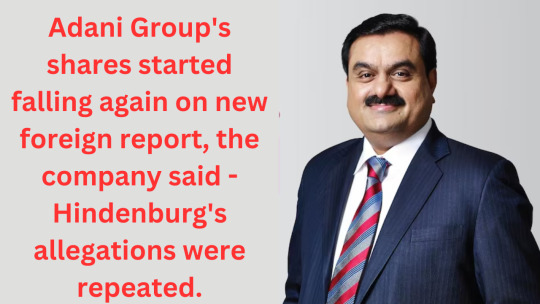
This OCCRP report has come about eight months after the release of the Hindenburg report. Hindenburg report gave a heavy blow to businessman Gautam Adani and his port-to-energy group.
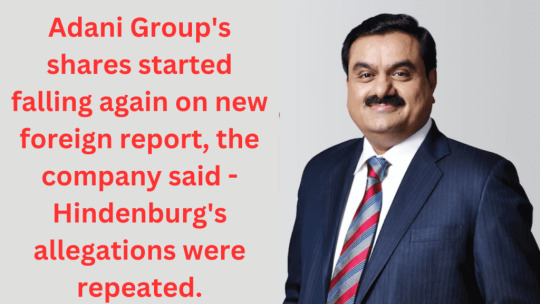
Organized Crime and Corruption Reporting Projects (OCCRP) has made several claims in a new series of allegations against Adani group companies following the report of American research firm Hindenburg in January this year. OCCRP has said that millions of dollars were invested in some of the group's publicly traded shares through an 'opaque' Mauritius fund. According to a Reuters report on Thursday, the non-profit media organization said in its report that the investment pattern has 'obscured' the involvement of alleged business partners of the Adani family.
Buying and selling through offshore Structures:-
The OCCRP has opened several tax haven zones And citing a review of files from internal company emails, it said during its investigation they found at least two cases where investors bought and sold stocks of Adani group companies through such offshore structures. This OCCRP report has come about eight months after the release of the Hindenburg report.
Short seller firm Hindenburg had said in its report that the Adani group had used tax haven countries like Mauritius to manipulate the shares of companies. However, the Adani group rejected all of Hindenburg's allegations. The group had said that it has always complied with the laws.
Adani Group called the allegations Baseless:-
In a statement to OCCRP, Adani Group said that the name of the Mauritius fund investigated by the journalists has already appeared in the Hindenburg report. The allegations are not only baseless and baseless, but are repeated from Hindenburg's allegations. Adani Group told OCCRP that it has been clearly stated that all publicly listed companies of Adani Group comply with all applicable laws including public shareholding related regulation.
Two investors named in the report of OCCRP:-
OCCRP named two individual investors in the report - Nasir. Ali Shaban Ahli and Chang Chung-Ling have been named as having made the alleged investments. OCCRP has said that both of them are old business partners of the Adani family. The media organization said that there is no evidence that Nasir Ali Shaban Ahli and Chang Chung-ling's money came from the Adani family. But an agreement in the reporting document, corporate records and an included email show that he traded in Adani stock and coordinated with the family. OCCRP said that their stake in Adani Holdings would exceed the estimated 75 per cent limit for insider ownership.
What is OCCRP?
Established in 2006, OCCRP publishes investigative news articles in partnership with media houses. According to the OCCRP website, it is funded by the Open Society Foundations, a unit of George Soares. American billionaire George Soros heads Soros Fund Management and the Open Society University Network.
Read the full article
0 notes
Text
Right then, while you fumble for your credit cards, I will talk about the rise of fakery: fake news, fake images, fake audio, fake politics.
Let me begin with someone I know. I admire Michela Wrong enormously. She does what journalists are meant to do: she afflicts the comfortable and comforts the afflicted.
Her beat was Africa, and Michela spent her career puncturing the West’s illusions about its rulers.
After Paul Kagame’s forces overthrew Rwanda’s genocidal Hutu regime in 1994, the world wanted to believe in a fairy story. The mass murder of Rwanda’s Tutsi population would be followed by peace, reconciliation and justice, it thought, as it threw praise and money at Kagame’s government.
Rwanda became the darling of the global aid industry. Under New Labour and the Tories, Kagame was feted.
Now our Conservative government declares that Rwanda is such a serene and safe country, Britain can dump asylum seekers there without the smallest concern for their safety or the faintest suspicion that corrupt officials will siphon off taxpayers’ money.
It was such a compelling story. Kagame and his idealistic group of young rebel fighters overthrow a genocidal regime ushering in an era of peace and stability. Under his leadership Rwanda became the West’s donor darling, hailed as Africa’s “Switzerland” or “Singapore”
The compelling story was also such balls. Michela exposed the lies, and has suffered a campaign of terrifying vilification as a result.
As AI and deep fake technology advance, not only journalists, politicians and celebrities, but potentially all of us can suffer equally ferocious attacks as calumny becomes ever easier to manufacture.
But first let me tell you what happened to Michela, then I will move on to the wider implications.
Her Do Not Disturb, and what a sweet title that was for a book about comfortable myths, was published in 2021.
She looked at the regime’s pursuit of opposition leaders, human rights activists and journalists. She showed how its critics were beaten and cowed into silence. And how, in the most high-profile cases, they “disappeared,” never to be seen again.
Michela has had her own punishment beating
Writing in this morning’s Observer she described how the regime hired a British PR company to coordinate the online hate attacks. She expected abuse after the book was published but….
What followed still took my breath away. A tide of vilification, expressed in petition form, on specially created websites, in pseudonymous Amazon reviews, and spread by literally hundreds of anonymous social media accounts. Almost all ignored the topic of my book – Kagame’s extraterritorial assassination campaign – while repeating certain tropes.
I’d always taken it as read I would be accused of racism. What was extraordinary, though, for a journalist who reported on the 1994 genocide for Reuters and the BBC, was to be accused of “genocide denial”.
But there was method in this malevolence. Genocide denial is now an accusation hurled at pretty much any government critic – including members of Kagame’s minority Tutsis who lost loved ones during the genocide. But it’s a crime in Rwanda, carrying a potential 10-year sentence, so I could in theory be arrested if I boarded a plane touching down in Kigali. When a Brussels restaurant owner cancelled my event after a tsunami of tweets and emails, I wondered if I even needed to worry about being arrested in Belgium. Rwandan government supporters have pushed for the EU’s laws on Holocaust denial to embrace supposed “negationists” like me.
Michela now wakes screaming in the night. Her nightmares convince her that Rwandan agents have broken into her flat.
“In the morning, I sometimes find chairs, duvets and pillows stuffed against the front door: my anxiety has bubbled up in my sleep. A therapist would probably mutter ‘PTSD’.”
As everyone who has been on the receiving end of hate campaigns knows, they work. Years of accusations that Michaela is a “racist” and “genocide denier” meant that…
“Anyone thinking of inviting me to speak at a conference or write an article will, on Googling my name, be presented with a list of accusations only the most stout-hearted – or those who know Rwanda – will casually brush away.”
The experience of Michela Wrong will become commonplace. Here without me needing to go out of my way to find them is a selection of stories from the past few days
Millions of people came across fake sexually explicit AI-generated images of Taylor Swift on social media. The White House Press Secretary told ABC News the Biden administration was "alarmed" by what happened to Swift online and that Congress "should take legislative action."
As it turns out, there is no federal law in the U.S. that would prevent or deter someone from creating and sharing non-consensual deepfake images. But there is a profitable commercial industry that thrives on creating and sharing digitally manufactured sexual content.
Do not think that fakery is confined to the famous
Yesterday the Times told the story of Helen Mort. In 2020 she found a fake porn film with images of her face taken from social media. Like Micheala she was horrified. She was even more horrified when she discovered that “an estimated 95 per cent of deepfakes online are non-consensual porn featuring women”.
As in the US, there is no single criminal offence in England and Wales that governs the taking, making and sharing of intimate images without consent.
On Thursday digital forensic investigators in Germany uncovered a vast, pro-Russia disinformation campaign against the Berlin government. It used tens of thousands of fake accounts on the social media platform X to attack Germany’s support for Ukraine. Russia generated more than 1m German-language posts from an estimated 50,000 fake accounts. They were dispatched at a rate of two every second.
On Friday Scientific American reported on how artificial intelligence was creating fake tapes of high school principals giving racist speeches. It also automatically generated calls, apparently from Joe Biden, urging citizens not to vote.
“Society,” the journal concluded, “may be woefully unprepared to deal with the resulting inevitable wave of digital fraud and the looming implication that any media item could be fraudulent.”
I don't know where that may in Scientific American’s conclusion came from. Society clearly is woefully unprepared,
Hany Farid, a computer science professor at the University of California described how the malicious actors held all the cards. It was incredibly easy to perpetrate a fraud, he explained.
“I record a person and clone their voice. And then I record myself saying what I want them to say with all the intonation—bad words and all—and it converts my voice into their voice. It’s all the same underlying generative AI technology.”
When it came to uncovering fraud, however…
“Detection is harder because it’s subtle; it’s complicated; the bar is always moving higher. I can count on one hand the number of labs in the world that can do this in a reliable way. That’s disconcerting.”
The falsely accused teachers will find it very hard to clear their name. While those who want to believe malicious fakery will feel justified in doing so.
As well as the innocent being falsely accused, the guilty will be able to say that they are innocent victims and AI generated the evidence against them.
As the technology for fakery explodes, and as states like Rwanda that no one believed capable of running propaganda operations and character assassination campaigns try to distort debate, the question arises what do we do.
I disagree with many of my fellow free-speech defenders who think that little or nothing should be done. We cannot go on with the Clinton era dispensation, which gave legal immunities to tech companies, without the rule of law falling into disrepute.
Everyone caught up in fake news attacks is baffled by the shortage of legal remedies against the AI companies that are profiting from their misery.
But clearly the law can only go so far. A deep fake outfit based in Northern Cyprus or some other bad land is effectively beyond the rule of law.
It strikes me that there are two possible futures.
The first isn’t so bad. People just shrug when dirt is thrown. They assume the evidence poisonous ideologues and movements use against their hate objects is fake. Or they follow the “ye without sin cast the first stone” principle. Or, and you can see this happening now, they say that when so many are attacked or are capable of being attacked, once shocking accusations lose their sting.
The second is, I am afraid, as likely.
Every election is swamped with fake news. The defeated side refuses to accept that they lost in a free-and-fair contest. High levels of trust, on which contented and prosperous societies depend, collapse. As more of us become like Michela Wrong and fear the power of the new technologies to destroy us, the more suspicious our world becomes.
11 notes
·
View notes
Text
Supporters of a coup in Niger have attacked the headquarters of the ousted president's party, setting it on fire and stoning and burning cars outside.
The small group of arsonists had broken away from a larger show of support for the coup leaders outside parliament, where Russian flags were on show.
The army has now given its backing to the troops who took President Mohamed Bazoum captive on Wednesday.
Russia joined other countries and the UN in calling for Mr Bazoum's release.
The 64-year-old, who was elected as Niger's president two years ago, is a key Western ally in the fight against Islamist militants in West Africa.
The US and France, the former colonial power, both have military bases in the uranium-rich country - and have condemned the coup.
US Secretary of State Antony Blinken called up Mr Bazoum promising Washington's "unwavering support".
Mr Bazoum took to Twitter on Thursday morning to issue a defiant statement: "The hard-won achievements will be safeguarded. All Nigeriens who love democracy and freedom will see to it."
His foreign minister has also been trying to rally support and urge dialogue, but the army chief of staff said he was backing the takeover to avoid fighting within the armed forces.
It remains unclear who is really in charge of Niger as the junta has not announced its leader.
Africa Live: Updates on this and other stories from the continent
Putin's show: Which African leaders will have star role?
Are military takeovers on the rise in Africa?
State TV has been repeating the late-night coup announcement interspersed with patriot music and Quranic verses - and its usual lunchtime news bulletin was not aired.
But in the capital, Niamey, shops and markets opened for business and after delays due to heavy rain early in the morning, coup supporters took to the streets.
The hundreds who gathered outside the National Assembly had some Russian flags, while others held up hand-written signs saying: "Down with France" and "Foreign bases out".
Police later fired tear gas to disperse those who had gone to the headquarters of the ruling party, where party activists ran away when they saw the protesters coming.
Some people were injured in the fracas and the burnt-out carcasses of vehicles now surround the PNDS Tarraya party building.
The coup supporters accuse the party of corruption and not doing enough to improve the security situation and end the long-running jihadist insurgency.
Two neighbouring countries, Mali and Burkina Faso, have experienced coups triggered by Islamist uprisings in recent years.
In both countries the new military leaders have moved closer to Russia after falling out with France.
"I hope they will install good security in the city and help us to achieve better conditions, because we have good resources. I don't care if they just want to follow Burkina Faso or Mali," Djibo, a supporter of the coup, told the BBC.
A number of well-known pro-Kremlin commentators on Telegram - one of the few major social media platforms not banned in Russia - have been posting comments in support of the coup, saying it is an opportunity for Russia and Wagner to get into Niger.
For the moment, there is no evidence of any Russian involvement in this takeover. Russian Foreign Minister Sergei Lavrov said constitutional order in Niger should be restored, Reuters says, quoting Russia's state-owned Tass news agency.
Some civil society groups in Niger have been calling for a move away from France and towards Russia in recent weeks.
The junta has reprimanded France for violating the closure of the country's borders after a military plane landed at an air-force base on Thursday morning.
2 notes
·
View notes